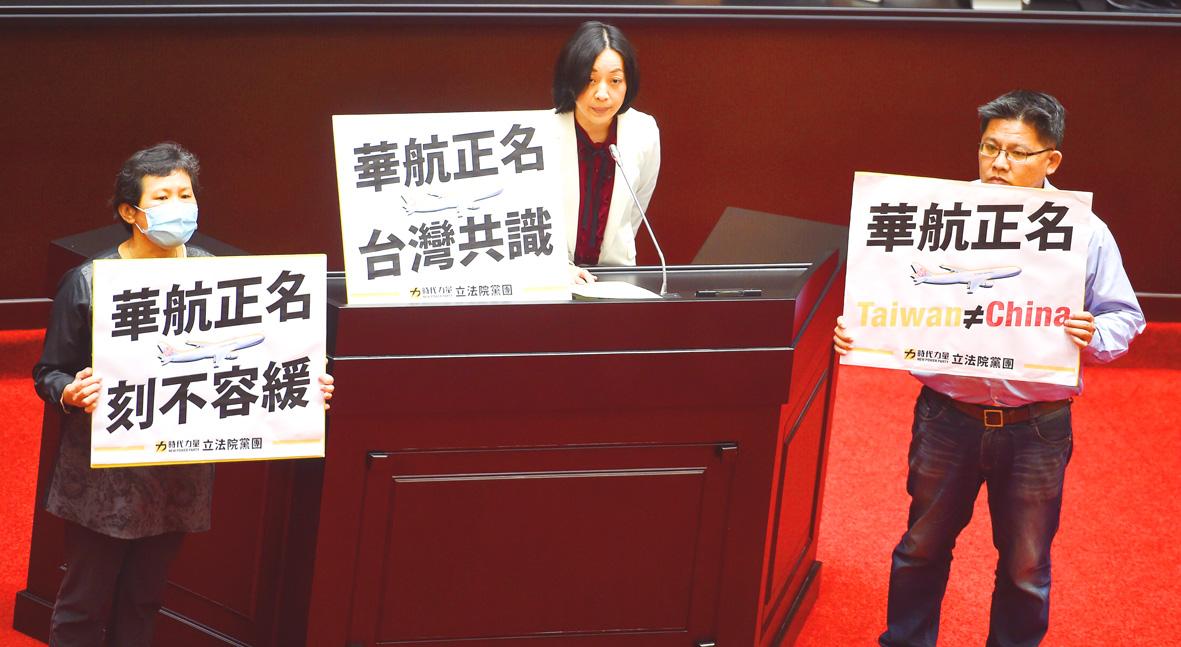Proposals to redesign the cover of the nation’s passport and rename state-run China Airlines (CAL) yesterday advanced to second readings, pending cross-caucus talks to be convened by the Democratic Progressive Party (DPP).
The DPP caucus tendered a motion to send to a second reading its proposal and one by Taiwan Statebuilding Party Legislator Chen Po-wei (陳柏惟) on redesigning the passport cover to highlight the marking or symbol of “Taiwan,” which was passed without objection.
The DPP’s proposal advocates any method that would emphasize the English and Chinese-language use of “Taiwan” on the cover, while Chen’s proposal seeks to replace the words on the cover with just “Taiwan (臺灣).”

Photo: Liu Hsin-de, Taipei Times
Chen cited the government as saying that as it strives to share with the world the nation’s achievements in containing the spread of COVID-19, the current passport design — whose cover bears the words “Republic of China” and “Taiwan” — could cause Taiwanese to be misidentified as Chinese and fall prey to discrimination.
The COVID-19 pandemic has caused some major nations to change their stance toward China, which could be followed by adjustments to their China policies, he said, adding that in this context, Taiwan should set itself apart from China, especially as Chinese state propaganda claims that Taiwan is part of its territory.
Chen said that his proposal, which was cosponsored by DPP legislators Wang Ting-yu (王定宇), Lin Chun-hsien (林俊憲) and Lin I-chin (林宜瑾), as well as 11 other lawmakers, would allow people to choose between a redesigned passport and the current version.
As nations have imposed entry restrictions amid the pandemic, Taiwanese are often flagged at immigration and resigned to explaining that they are from Taiwan, not China, Wang said, adding that the confusion could negatively affect Taiwan’s trade.
The proposal would not involve a constitutional amendment, as it only deals with the markings on passports, so relevant agencies should be able to promptly address the matter flexibly, he said.
Wang said that he supports retaining the Chinese-language title “Republic of China,” while using “Taiwan” to signal the nation’s English-language title to “minimize disagreement domestically and maximize the distinction abroad.”
Meanwhile, the DPP and the New Power Party (NPP) caucuses each tendered a proposal to rename China Airlines.
The DPP’s proposal says that the Ministry of Transportation and Communications should meet with relevant agencies to devise plans to repaint its aircraft in ways that would highlight Taiwan or its symbols, on the condition that such actions would not affect the nation’s air rights.
The NPP’s motion calls for the “China Airlines” logo to be minimized and the word “Taiwan” or its outline to be added to aircraft fuselages, following reports of European nations confusing shipments of medical supplies donated by the government with those from China.
Both proposals say that any forthcoming design must make a distinction between China Airlines and Chinese state-run Air China.
The DPP caucus is responsible for scheduling cross-caucus negotiations on the proposals to redesign the passport, while the NPP and the DPP would jointly be responsible for scheduling talks on renaming China Airlines, Deputy Legislative Speaker Tsai Chi-chang (蔡其昌) said.

DEFENSE: The National Security Bureau promised to expand communication and intelligence cooperation with global partners and enhance its strategic analytical skills China has not only increased military exercises and “gray zone” tactics against Taiwan this year, but also continues to recruit military personnel for espionage, the National Security Bureau (NSB) said yesterday in a report to the Legislative Yuan. The bureau submitted the report ahead of NSB Director-General Tsai Ming-yen’s (蔡明彥) appearance before the Foreign and National Defense Committee today. Last year, the Chinese People’s Liberation Army (PLA) conducted “Joint Sword-2024A and B” military exercises targeting Taiwan and carried out 40 combat readiness patrols, the bureau said. In addition, Chinese military aircraft entered Taiwan’s airspace 3,070 times last year, up about

Taiwan is stepping up plans to create self-sufficient supply chains for combat drones and increase foreign orders from the US to counter China’s numerical superiority, a defense official said on Saturday. Commenting on condition of anonymity, the official said the nation’s armed forces are in agreement with US Admiral Samuel Paparo’s assessment that Taiwan’s military must be prepared to turn the nation’s waters into a “hellscape” for the Chinese People’s Liberation Army (PLA). Paparo, the commander of the US Indo-Pacific Command, reiterated the concept during a Congressional hearing in Washington on Wednesday. He first coined the term in a security conference last

A magnitude 4.3 earthquake struck eastern Taiwan's Hualien County at 8:31am today, according to the Central Weather Administration (CWA). The epicenter of the temblor was located in Hualien County, about 70.3 kilometers south southwest of Hualien County Hall, at a depth of 23.2km, according to the administration. There were no immediate reports of damage resulting from the quake. The earthquake's intensity, which gauges the actual effect of a temblor, was highest in Taitung County, where it measured 3 on Taiwan's 7-tier intensity scale. The quake also measured an intensity of 2 in Hualien and Nantou counties, the CWA said.

The Overseas Community Affairs Council (OCAC) yesterday announced a fundraising campaign to support survivors of the magnitude 7.7 earthquake that struck Myanmar on March 28, with two prayer events scheduled in Taipei and Taichung later this week. “While initial rescue operations have concluded [in Myanmar], many survivors are now facing increasingly difficult living conditions,” OCAC Minister Hsu Chia-ching (徐佳青) told a news conference in Taipei. The fundraising campaign, which runs through May 31, is focused on supporting the reconstruction of damaged overseas compatriot schools, assisting students from Myanmar in Taiwan, and providing essential items, such as drinking water, food and medical supplies,